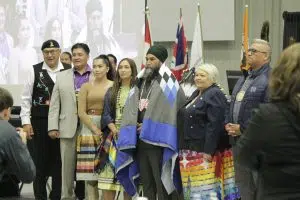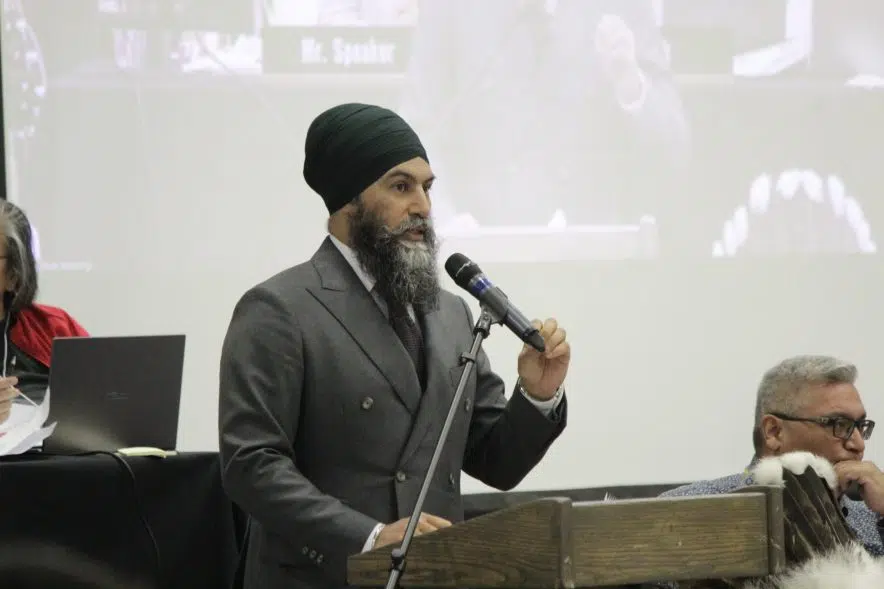The federal NDP leader visited Saskatchewan for the second time in just over a month to discuss issues of importance to Indigenous communities and leaders.
On Wednesday, the Federation of Sovereign Indigenous Nations welcomed Jagmeet Singh to speak during its All-Chiefs Assembly in North Battleford.
In his speech to the hundreds of chiefs gathered at the Northland Power Curling Centre, Singh spoke about the power of language, his fight for better housing, and other issues impacting Indigenous people like health care in remote communities and the impacts of climate change.
Singh told those gathered that he is a fighter, wanting to ensure those issues are addressed.
He touched on the ongoing crisis of murdered and missing Indigenous women and girls, and said Canada needs to implement all calls for justice put forward by Canada’s Truth and Reconciliation Commission.
Singh also took aim at the Saskatchewan First Act, saying it didn’t promote Indigenous interests or economic prosperity for Indigenous communities — especially when development or trade involves their land or resources.

Jagmeet Singh receives a blanket as a gift from FSIN in North Battleford on May 24, 2023. (Libby Giesbrecht/650 CKOM)
“I think that’s wrong,” Singh said in his speech. “If we work in partnership, things get done … everyone benefits.”
Taking questions from the crowd, Singh heard from Indigenous leaders about issues they are seeing and want action on — including funding for homeless shelters, compensation for residential day school survivors and equality in education for their communities.
Singh was informed of concerns about Bill C-21 restricting firearms, to which the federal leader explained that because of Indigenous advocacy, a portion of the current bill allows for Indigenous communities to continue to use firearms as needed to live in the way they’re accustomed. That comment received applause from those assembled.
To several requests for federal assistance, Singh said he would work to bring issues to the attention of the federal government and inquire further into what can be done.
“We would absolutely love to help out,” Singh responded to one chief asking about compensation for residential day school survivors in Saskatchewan.
Another chief asked why Jordan’s Principle applications — which are in place to ensure Indigenous children in Canada have access to the services and support they need — for children in Saskatchewan aren’t being addressed as quickly or effectively as similar applications in other provinces.
Singh said he wasn’t aware of that issue, but said it was troubling to him.
“There should be equal application of that,” he said. “Indigenous kids deserve the same funding as non-Indigenous kids, and that should be the case across the country.”
When asked by media whether he would support an inquiry on the issue of foreign interference in elections, Singh responded that he disagreed with former governor general David Johnston’s decision not to pursue an inquiry.
Singh said he feels Prime Minister Justin Trudeau is not taking the issue seriously, and added that Pierre Polievre, leader of the Conservative Party, is playing games by refusing meetings. Singh himself promised to take the issue seriously by hearing and seeing the evidence, promising to move forward in a way that will best safeguard Canadian democracy.
Asked about wildfires, Singh said solutions should be constantly looked for and resources should be provided to those who have had to flee their homes because of disasters. He also noted that forest fires should not be normalized, and said preventative action should be taken, rather than acting after disaster has struck.
Commenting on local issues, Singh spoke about wanting to be an ally to Indigenous communities, especially through partnerships and ensuring economic prosperity.
When asked about the federal target of reaching net-zero carbon emissions from power generation by 2035 — a goal which Saskatchewan Premier Scott Moe has said is not attainable in the province — Singh agreed the solution should not come with a major price increase for SaskPower customers.
Singh was presented with a blanket as a gift by Federation of Sovereign Indigenous Nations Chief Bobby Cameron during his visit.







